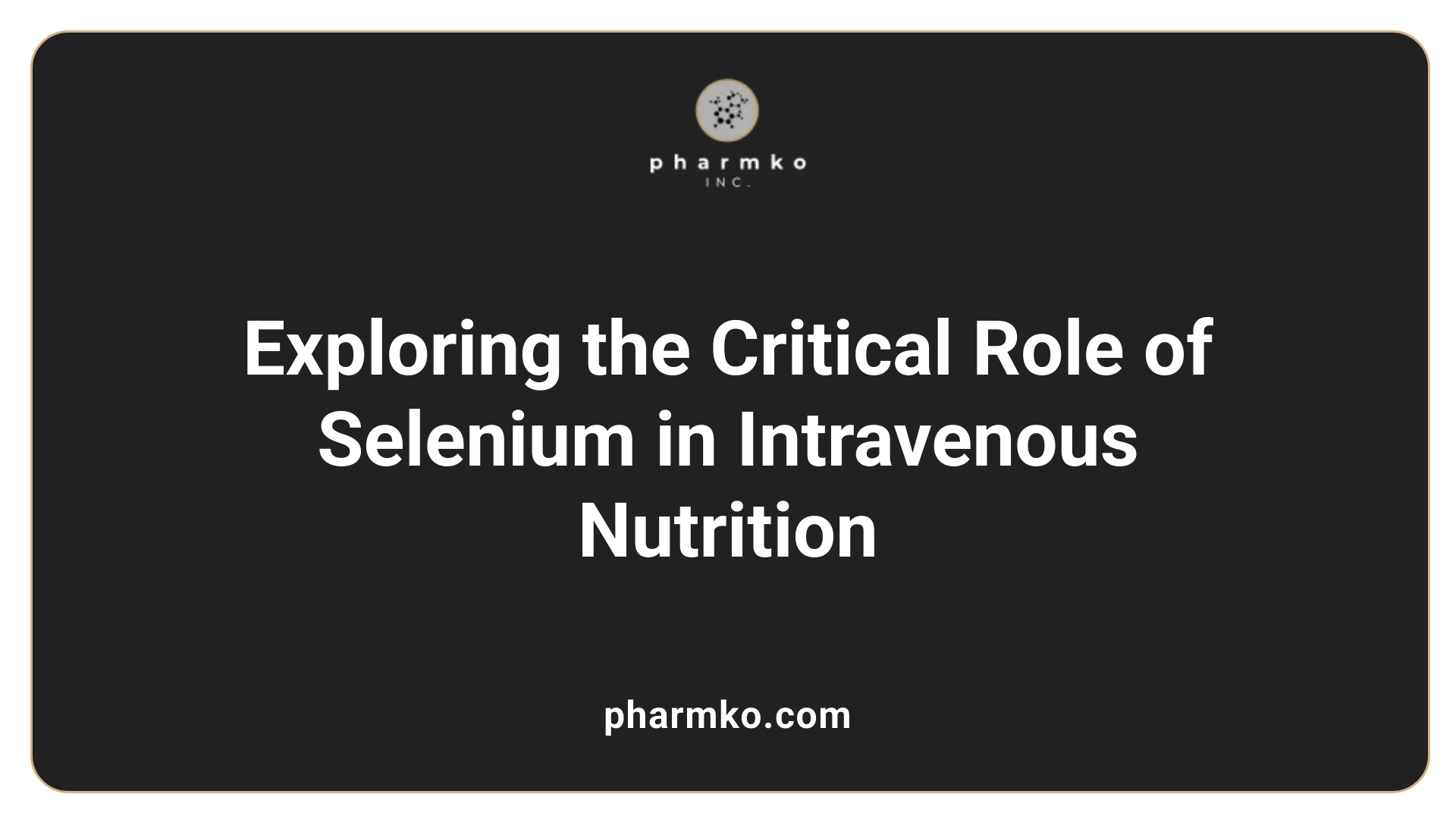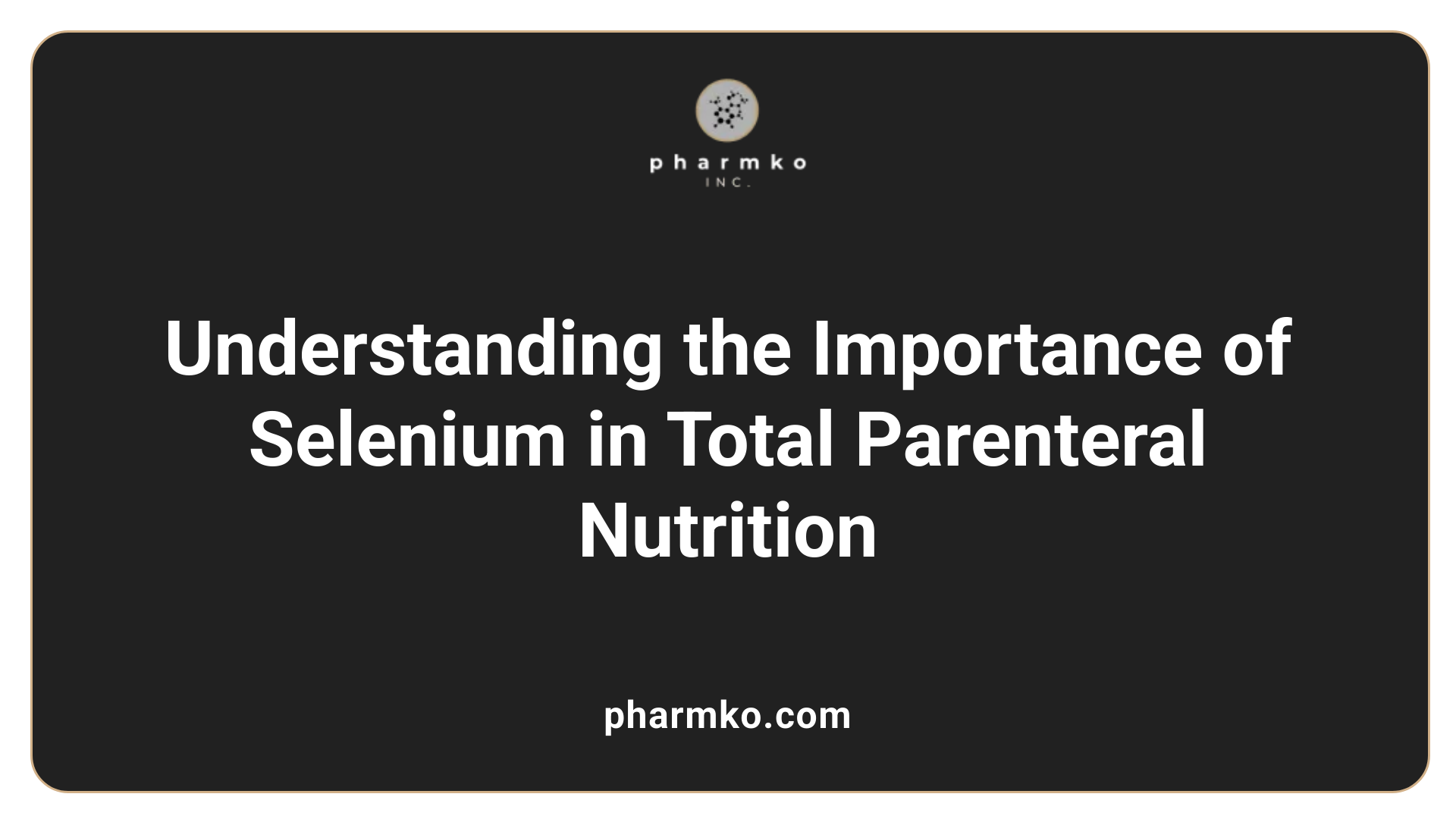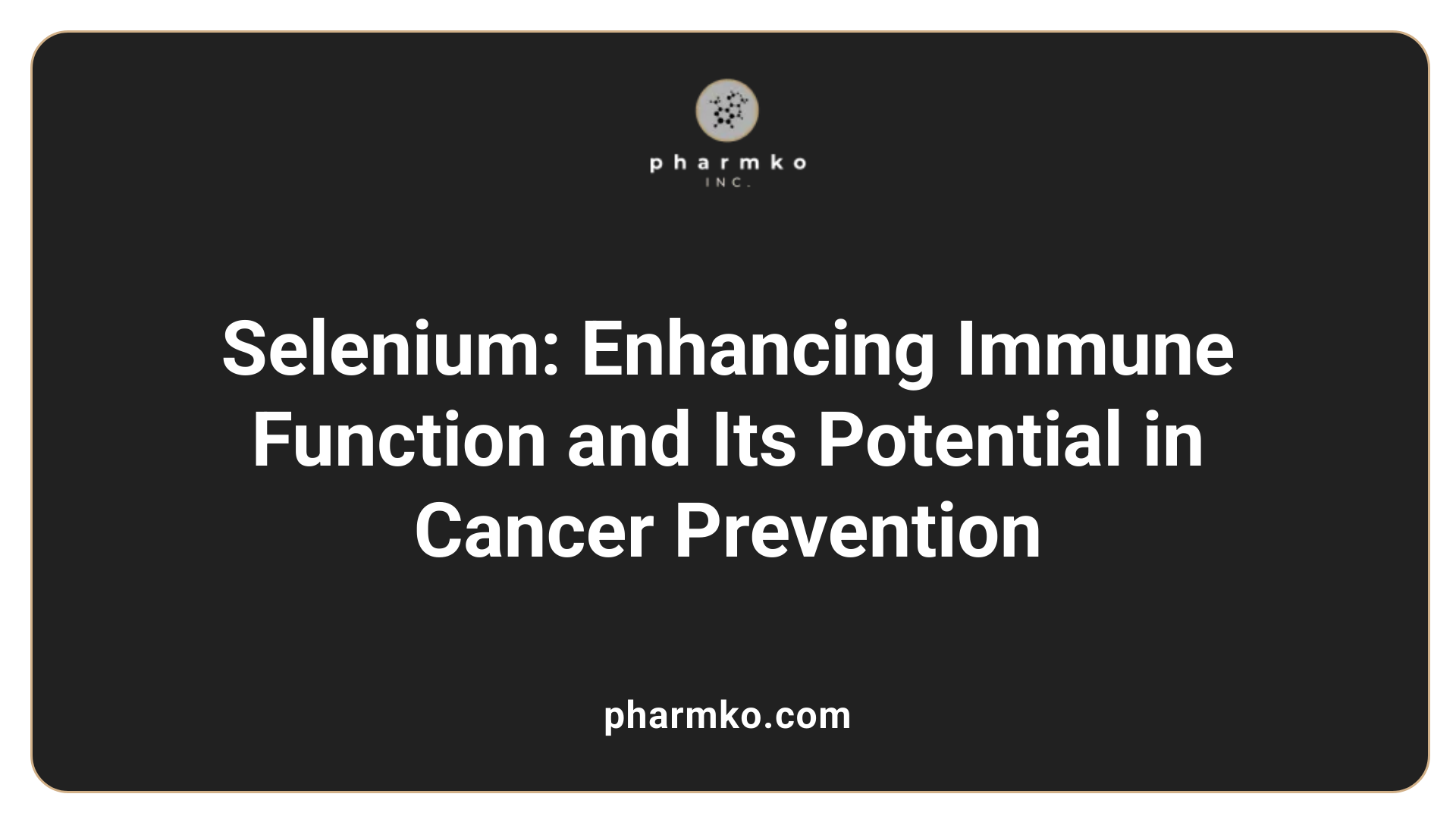The Role of Selenium in Parenteral Nutrition and Immune Health
Introduction to the Significance of Selenium
Selenium (Se), a crucial mineral in human health, plays instrumental roles in both parenteral nutrition and immune system functions. Its inclusion in clinical nutrition is particularly vital for patients reliant on intravenous feeding. The conversation around selenium underscores its implications in immunity, especially concerning its deficiency and supplementation requirements. This article delves into selenium's imperative contributions to combating oxidative stress, fostering immune resilience, and its broader impact on patient health outcomes.
Selenium in Intravenous Nutrition

What is selenium in intravenous nutrition?
Selenium (Se) is an essential nutrient that plays a critical role in various bodily functions, particularly in the context of immune health and antioxidative defense. It is a vital component of selenoproteins, which are crucial for maintaining antioxidant activity, especially through the enzyme glutathione peroxidase. Without adequate selenium, individuals can experience severe health complications, including cardiomyopathy, myalgias, and increased susceptibility to infections.
For patients receiving parenteral nutrition (PN), particularly those who cannot consume food orally or have specific metabolic challenges, selenium supplementation is vital. This trace element can be administered intravenously, either as part of a multi-trace element product or as a standalone formulation. The typical daily requirement ranges from 60 to 100 mcg; however, critically ill patients may need up to 400 mcg daily to address their specific metabolic needs.
How does parenteral nutrition prevent selenium deficiency?
Parenteral nutrition that lacks sufficient selenium can significantly compromise patient health. Studies have shown that approximately 23% of ICU patients require PN, which often does not provide adequate selenium levels, leading to a heightened risk of deficiency. Monitoring selenium levels is essential to prevent serious complications.
Given that selenium deficiency can directly impact immune function and increase infection risks, it’s crucial to ensure that patients on long-term PN receive appropriate amounts. Regular assessments of plasma selenium levels alongside markers of systemic inflammation are recommended to optimize overall health outcomes in these patients. The integration of selenium in PN formulations is, therefore, not just routine; it is essential for supporting immune health and preventing adverse clinical outcomes.
The Multifaceted Role of Selenium in Nutrition

What is the role of selenium in nutrition?
Selenium is a vital trace mineral essential for various physiological functions in human health. It acts as a crucial component of selenoproteins, which are proteins that contain selenium and play significant roles in DNA synthesis, immune function, reproduction, and thyroid hormone metabolism. Selenium's antioxidant properties help protect cells from oxidative damage and reduce inflammation, making it a key player in maintaining overall health.
The Recommended Dietary Allowance (RDA) for selenium in adults is 55 micrograms per day , with slightly higher requirements for pregnant and lactating women. However, selenium deficiency is relatively rare in the United States, although certain groups—particularly those with limited dietary variety—may not meet their selenium needs. Inadequate selenium levels can lead to serious health issues, including impaired immune responses and increased susceptibility to infections.
Moreover, while selenium is crucial, it’s essential to be cautious about intake; excessive selenium consumption can lead to toxicity. The Tolerable Upper Intake Level (UL) is set at 400 micrograms per day , balancing the need for this mineral without risking adverse effects.
Functions of selenium in human health
Selenium is integral for several bodily functions, notably in the production of selenocysteine, which is vital for the function of glutathione peroxidase—an enzyme critical for the antioxidative defense of cells. Adequate selenium levels protect the immune system by facilitating the proliferation of T cells and enhancing the body's ability to combat infections, particularly viral infections.
Recent research indicates that selenium deficiency can lead to multiple health complications, including:
- Cardiomyopathy
- Myalgias and myositis
- Anemia
- Impaired cellular immunity
Furthermore, a specific condition known as Keshan disease , endemic in certain regions, is directly linked to selenium deficiency, highlighting the importance of this mineral in health outcomes.
Rationale for Including Selenium in TPN

Why Should Selenium Be Added to Total Parenteral Nutrition (TPN)?
Selenium should be added to total parenteral nutrition (TPN) because it is a pivotal trace element that supports various physiological functions crucial for health. Notably, selenium contributes to antioxidative defense through its role in the enzyme glutathione peroxidase. It also supports immune function, plays a vital role in thyroid hormone metabolism, and is integral to protein and DNA synthesis.
Patients on TPN are especially at risk of selenium deficiency. For instance, evidence from clinical settings shows that individuals reliant on TPN often experience low selenium levels, which can lead to significant health issues. A notable case detailed a long-term TPN patient developing symptoms related to low selenium, including changes in their nail beds, a common indicator of deficiency. Following supplementation, the patient's selenium levels normalized, and symptoms improved, demonstrating the need for selenium's inclusion in TPN formulations.
Examples of Selenium Deficiency Effects
Selenium deficiency can lead to a range of serious health issues, including:
- Cardiomyopathy: Specifically associated with Keshan disease, an endemic condition linked to selenium deficiency, primarily observed in certain regions of China.
- Myopathies and Muscular Issues: Such as myalgias and myositis, significantly impacting muscle strength and function.
- Impaired Immune Response: Low selenium levels can result in increased susceptibility to infections, particularly affecting those who are immunocompromised or critically ill.
Thus, incorporating selenium in TPN is essential to prevent deficiency and promote better clinical outcomes in at-risk populations.
Selenium's Contribution to Immune Function and Its Cancer Link

What is the role of selenium in the immune system and its link to cancer?
Selenium is recognized for its essential role within the immune system, acting primarily through its incorporation into selenoproteins. These proteins are vital for antioxidant defenses, helping to protect cells from oxidative stress that can compromise immune responses. Selenium contributes to the production of glutathione peroxidase, an enzyme crucial for maintaining cellular health and function.
Moreover, adequate selenium status has been linked with improved immune responses. For example, studies have shown that selenium supplementation can enhance both humoral and cell-mediated immunity. This enhancement suggests that selenium not only supports immune function but may also play a role in stimulating antitumor immunity, hinting at its potential benefits for cancer prevention.
However, the relationship between selenium and cancer is nuanced. Low selenium levels have been associated with increased cancer risk, while excess selenium can have detrimental effects. Research indicates that moderate supplementation might stimulate an antitumor immune response, whereas high doses may lead to immunotoxicity. The complexities of selenium's impact highlight the need for careful consideration of dosing, as emphasized in studies that examine this trace element’s dual role.
Additionally, plant sources rich in selenium, like fennel, may further contribute to detoxifying carcinogens due to their antioxidant properties. This underscores selenium's potential in the broader context of health, linking it to both improved immune function and a proactive role in cancer mitigation.
Overall, the role of selenium in the immune system and its connection to cancer prevention warrant further investigation, particularly regarding optimal dosing strategies in clinical settings.
Selenium: An Antioxidant Powerhouse
What are the Antioxidant Properties of Selenium?
Selenium is recognized for its remarkable antioxidant properties, which play a crucial role in protecting cells from oxidative damage. This element is a vital part of selenoproteins, a group of proteins that express antioxidant enzymes. The primary role of these enzymes is to neutralize harmful reactive oxygen species (ROS) that can lead to cellular injury and various diseases.
By incorporating selenium into parenteral nutrition (PN), healthcare providers can enhance the antioxidant defenses of critically ill patients. Sufficient selenium levels can mitigate oxidative stress, which is particularly beneficial for supporting immune function in patients under metabolic stress.
How Does Glutathione Peroxidase Contribute?
One of the key enzymes influenced by selenium is glutathione peroxidase. This enzyme is critical in managing oxidative stress, as it facilitates the conversion of harmful hydrogen peroxide into water and oxygen. This action helps in maintaining redox balance in cells and tissues, thus promoting overall health and immunity.
Impaired activity of glutathione peroxidase due to selenium deficiency can result in diminished host defenses, making individuals more susceptible to infections and chronic conditions. Regular monitoring of selenium levels, particularly in patients receiving long-term PN, can help ensure sufficient enzymatic activity and optimal immune responses.
Effects of Selenium Deficiency
Impact of selenium deficiency on health
Selenium deficiency can lead to severe health complications. Key conditions associated with a lack of selenium include cardiomyopathy, myalgias, and myositis. Individuals may also experience anemia and impaired cellular immunity. Notably, Keshan disease, an endemic form of cardiomyopathy, is directly linked to insufficient selenium intake and remains a public health concern in specific regions, particularly China.
The immune system also faces detrimental effects, as selenium is vital for the proper function of selenoproteins. A deficiency can compromise the body's ability to mount adequate immune responses, increasing vulnerability to infections, viruses, and allergens. This is particularly concerning among critically ill patients, whose immune function is already under duress.
Common clinical signs of deficiency
Clinical manifestations of selenium deficiency can be diverse and serious. Some of the most common signs include:
- Myopathy : Muscle weakness and pain due to muscle tissue damage.
- Cardiomyopathy : Heart muscle disorders that can lead to heart failure.
- Anemia : Reduced red blood cell count leading to fatigue and weakness.
- Impaired Immune Response : Increased risk of infections and longer recovery times from illnesses.
- Growth Retardation : In infants, especially those on long-term parenteral nutrition (TPN), inadequate selenium can hinder normal growth and development.
Ensuring sufficient selenium intake is crucial for maintaining overall health and preventing these serious health complications.
Dosage Recommendations for Selenium in Parenteral Nutrition
Recommended dosage levels
Selenium is an essential nutrient that should be included in parenteral nutrition (PN) formulations to prevent deficiency. The typical daily requirement of selenium for adult patients on PN ranges between 60-100 mcg. However, critically ill patients, especially those with significant burns or extensive injuries, may require higher doses, sometimes up to 400 mcg/day.
Additionally, studies suggest that providing at least 1000 mcg/day of selenium can significantly reduce all-cause mortality in critically ill patients, highlighting the importance of adequate dosing. Regular monitoring of selenium levels is crucial to avoid excessive accumulation, especially for patients receiving long-term PN.
Special considerations for critically ill patients
In critically ill patients, selenium supplementation is vital because their metabolic needs are heightened, and they are often at risk for lower selenium status. Evidence shows that, without adequate selenium, patients can experience decreased immune function, increasing their risk of infections. Moreover, preterm infants on long-term PN frequently require higher selenium doses, sometimes up to 12 mcg/kg/day, to maintain optimal serum levels due to their limited storage capability and rapid growth.
Regular evaluation of plasma selenium levels combined with systemic inflammation markers, like C-reactive protein, is necessary, particularly in those on PN for an extended duration. This proactive approach helps to ensure patient health and optimize immune responses.
Selenium Deficiency and Cardiovascular Health

What is Keshan Disease?
Keshan disease is a serious consequence of selenium deficiency characterized by endemic cardiomyopathy, primarily observed in China. This health issue arises when selenium levels drop too low, impacting heart function. The disease illustrates the critical role that adequate selenium plays in maintaining cardiovascular health, as it is intimately linked to the body's antioxidant defenses.
How does selenium deficiency impact global health?
Globally, selenium deficiency is recognized as a growing concern affecting populations, especially in areas where the soil lacks this essential trace mineral. Deficiencies can manifest in various forms, leading to serious health complications, including impaired immune response and cardiovascular disorders. As seen with Keshan disease, the implications stretch beyond isolated communities, underscoring the need for adequate selenium in diets, particularly in regions at risk of deficiency.
| Health Concern | Selenium Deficiency Impact | Global Relevance |
|---|---|---|
| Keshan Disease | Cardiomyopathy | Endemic in China |
| Immune Dysfunction | Increased infection risk | Worldwide concern |
| Cardiovascular Issues | Myocardial disorders | Significant health impact |
Providing selenium through parenteral nutrition or dietary sources remains essential for preventing deficiency-related diseases globally.
Selenium, Oxidative Stress, and Immune Defense
Role in Reducing Oxidative Stress
Selenium (Se) is crucial in protecting the body against oxidative damage. It serves as a cofactor for glutathione peroxidase, an enzyme that minimizes oxidative stress by breaking down harmful reactive oxygen species. This activity is vital for maintaining healthy immune responses, particularly in individuals facing metabolic stress due to illness or aging.
Adequate selenium levels help maintain the body’s redox status, thus supporting overall health. Deficiencies can lead to reduced enzyme activity and compromised defenses against oxidative stress, affecting multiple body systems and increasing susceptibility to infections.
Support in Immune Resilience
Selenium significantly influences immune function through its incorporation into selenoproteins, which are essential for optimal immune responses. Studies show that selenium supplementation can enhance both humoral and cell-mediated immunity, resulting in improved antibody responses and T cell activity. For instance, participants exhibited enhanced responses to vaccines following selenium intake, indicating its role in bolstering immune resilience.
Furthermore, selenium deficiency is associated with lower immune efficacy, putting individuals at higher risk for infections. Ensuring adequate selenium intake, particularly in critically ill patients and populations reliant on parenteral nutrition, is therefore essential for fostering robust immune defenses and improving overall health outcomes.
Research Findings on Selenium and Immune Response
Selenium's Effect on Viral Pathogenesis
Selenium plays a critical role in combating viral infections and enhancing immune responses. Research indicates that selenium's antioxidant properties help reduce viral pathogenesis, making it significant for immune health, especially in vulnerable populations such as the elderly and critically ill patients. Incorporating selenium into parenteral nutrition (PN) has been linked to improved immune function, including increased interferon-gamma production and T-cell proliferation. This enhanced immune activity can aid in the more rapid clearance of viruses like poliovirus following vaccination.
Influence on Immune Responses
The relationship between selenium levels and immune responses is evident in various studies. Patients with low selenium status show suboptimal immune functions, leading to an increased susceptibility to infections. Conversely, supplementation has been associated with improved immune responses, evidenced by enhanced antibody titers against vaccines and stimulated proliferation of lymphocytes.
Furthermore, selenium's presence in the diet can influence different types of immunity, positively affecting defenses against certain pathogens while showing variable effects on allergies and asthma. Thus, maintaining adequate selenium levels is crucial for supporting both humoral and cell-mediated immune responses, underscoring its importance in critical care settings.
Role in Selenoprotein Synthesis
Selenocysteine and Protein Synthesis
Selenium is a vital trace element that primarily contributes through its involvement in the synthesis of selenocysteine, an amino acid that incorporates selenium into proteins known as selenoproteins. These proteins are essential for several biological processes, including antioxidant defense, where they help neutralize harmful reactive oxygen species (ROS) that can compromise cellular function. Notably, the enzyme glutathione peroxidase, which is crucial for protecting the body from oxidative stress, depends on selenium for its activity.
Implications for Immune Health
The production of selenoproteins has significant implications for immune health. Adequate selenium levels enhance immune function by facilitating T-cell proliferation and supporting both humoral and cell-mediated immune responses. In particular, increased selenium has been linked to improved responses to vaccinations, such as higher antibody titers against pathogens. This is particularly critical for vulnerable populations, such as patients on long-term parenteral nutrition who may experience selenium deficiency, adversely affecting their immune defenses. Regular supplementation and careful monitoring of selenium levels are necessary to ensure optimal immune health and maintain the body's resilience against infections.
Selenium Supplementation in Critical Care
Benefits in Critical Illness
Selenium is increasingly recognized for its role in enhancing immune function, particularly in critically ill patients requiring parenteral nutrition (PN). Selenium acts as a vital cofactor for glutathione peroxidase, an enzyme important for antioxidative defense. This not only helps protect against oxidative stress but also supports immunity by boosting cellular responses to pathogens and infections.
Research indicates that selenium deficiency can lead to serious complications, including weakened immune responses and an increased risk of infections. In critically ill patients, supplemental selenium has shown potential benefits in reducing mortality rates. For instance, higher doses, particularly around 1000 mcg/day, have been linked to favorable outcomes, although the efficacy may vary based on individual patient conditions.
Trial Outcomes
Significant trials have assessed selenium's impact on patient health outcomes. In one study, daily selenium supplementation (500 μg) did not yield a significant reduction in new infections across all participants, yet those treated for five days or more showed a notable decrease in infection rates (odds ratio 0.53). While no substantial effects on mortality were observed in this study, cumulative evidence suggests that prolonged selenium supplementation could provide considerable advantages for immune health in critical settings.
Overall, ongoing research, including large-scale trials like the SIGNET trial, continues to explore the optimal use of selenium in critical care, highlighting its potential role in improving health outcomes.
Clinical Guidelines for Selenium Monitoring
Importance of Regular Monitoring
Monitoring selenium levels is crucial for patients on parenteral nutrition (PN) to prevent deficiency and associated health complications. Continued deficiency may lead to severe issues such as cardiac problems, muscle myopathy, and increased susceptibility to infections. Particularly in critically ill patients, effective monitoring can help maintain optimal immune function and overall health.
Methods for Selenium Level Assessment
Various methods exist for assessing selenium levels in patients. Key approaches include:
- Plasma Selenium Measurement: A primary method used to determine selenium status through blood samples.
- Monitoring Inflammatory Markers: Tracking systemic inflammation markers, like C-reactive protein, can provide insights into selenium status and overall health.
- Assessment Frequency: Initial evaluations should occur at four weeks after any dose adjustments, followed by check-ups every 1-3 months once stable.
Regular assessment is particularly essential in preterm infants receiving long-term PN, as they may require higher selenium doses due to their increased metabolic and developmental needs.
Selenium's Role in Thyroid Function
Influence on Thyroid Hormone Metabolism
Selenium is integral to thyroid hormone metabolism, particularly in the conversion of thyroxine (T4) to the more active triiodothyronine (T3).
This process is essential for maintaining appropriate metabolic rates in the body. A deficiency in selenium can disrupt this conversion, leading to a lower ratio of T3 to T4, which may negatively impact energy metabolism and overall health. Adequate selenium levels help ensure that T3 can perform its vital roles in growth, development, and metabolic regulation.
Impact on Overall Metabolic Health
Selenium's influence on thyroid function directly correlates with overall metabolic health. The antioxidant properties of selenium, primarily through its role in the enzyme glutathione peroxidase, mitigate oxidative stress that can impair thyroid function and lead to unwanted metabolic consequences.
A decline in selenium status can interfere with thyroid hormone action, contributing to conditions such as fatigue, weight changes, and altered thermoregulation. Ensuring adequate selenium intake, especially through parenteral nutrition in vulnerable populations, is thus crucial for sustaining metabolic health and facilitating optimal thyroid performance.
Parenteral Nutrition and Selenium Safety
Safety protocols for selenium in PN
When administering selenium through parenteral nutrition (PN), safety protocols are crucial to ensure optimal patient outcomes. Given the risks associated with selenium deficiency, it is essential that all PN formulations include adequate amounts of this trace element. However, care must also be taken to avoid excessive selenium levels. Routine blood tests to monitor plasma selenium concentrations help inform dosage adjustments accordingly.
Importance of personalized dosing
Personalized dosing is vital, especially for populations such as critically ill patients or infants on chronic total parenteral nutrition (TPN). These groups may require higher doses, sometimes exceeding 400 mcg/day. Regular monitoring, typically every 1–3 months following any dose changes, aids in tailoring selenium delivery to individual patient needs. Personalized dosing strategies help mitigate risks such as toxicity while ensuring sufficient levels to support immune function and overall health.
| Patient Group | Typical Requirement | Monitoring Frequency |
|---|---|---|
| Adults & Children | 60-100 mcg/day | Every 1-3 months |
| Critically Ill Patients | Up to 400 mcg/day | Monthly during stability |
| Preterm Infants | 6-12 mcg/kg/day | Monthly after starting |
As selenium plays a critical role in immune health and oxidative stress management, effective safety measures and tailored dosing are imperative in parenteral nutrition contexts.
Selenium and Infant Health
Importance for preterm infants
Selenium (Se) is an essential trace element critically important for the growth and immune function of infants, particularly preterm ones. Due to their limited selenium storage and rapid growth rates, preterm infants are at a heightened risk of selenium deficiency. Adequate selenium levels are vital for supporting immune health, as selenium concentrations play an important role in the activity of enzymes like glutathione peroxidase, which are essential for antioxidative defense.
Deficiency risks and supplementation needs
Without sufficient selenium, infants could experience serious health issues including an impaired immune response, cardiomyopathy, and a heightened risk of infections. Recent studies underscore the necessity of selenium supplementation in these populations, recommending initial doses for preterm infants on total parenteral nutrition (TPN) start at 6 mcg/kg/day, with some studies suggesting requirements could be as high as 12 mcg/kg/day. Regular monitoring should commence one month after initiating supplementation to ensure selenium levels remain adequate and to adjust dosing as necessary.
Ensuring appropriate selenium levels is therefore paramount not only for immediate immune functions but also for long-term growth and development, highlighting the critical role of this trace element in nutritional strategies for vulnerable populations.
Future Directions in Selenium Research
Emerging Trends and Ongoing Studies
Research in selenium's role in parenteral nutrition and critical care is rapidly evolving. Recent systematic reviews have suggested a positive correlation between selenium supplementation and reduced infections and mortality rates among critically ill patients. Ongoing large-scale trials like the SIGNET trial aim to further elucidate selenium's efficacy in enhancing immune function and patient outcomes.
Additionally, a factorial approach is being employed to assess the independent and combined effects of selenium and glutamine on critically ill patients, addressing their distinct roles in immune function. This could pave the way for optimized nutritional protocols in critical care settings.
Potential Areas for Further Research
There remains a significant need for well-designed randomized controlled trials focusing on selenium dosing and its relationship with immune response, especially in vulnerable populations like preterm infants. Studies are discovering that infants on long-term parenteral nutrition often require higher doses of selenium, necessitating further investigation into optimal supplementation strategies.
Furthermore, the impact of selenium on chronic diseases, its influence on thyroid function, and its interaction with other trace elements in parenteral formulations hold considerable research promise. Given selenium's critical role in immune health and oxidative stress management, future studies could reveal more about its diverse biological functions and therapeutic potential.
Combining Selenium with Other Nutrients
Selenium and Glutamine in PN
Selenium is increasingly being studied in combination with other nutrients, particularly glutamine, in parenteral nutrition (PN) formulations. Research has indicated the potential benefits of these two supplements in enhancing immune function and overall health outcomes in critically ill patients. Glutamine, an amino acid, plays a crucial role in maintaining gut integrity and immune health, while selenium contributes to antioxidative defense and thymic function. Combining these nutrients could offer synergistic effects, further supporting immune responses during critical illness.
Synergistic Effects on Health Outcomes
The interaction between selenium and glutamine in PN may improve clinical outcomes significantly. Some studies have suggested that selenium supplementation, particularly when given concurrently with glutamine, might help reduce infections and enhance recovery rates in patients. For instance, the SIGNET trial aims to explore these combined effects more thoroughly, as emerging evidence hints at improved immune responses and lower mortality rates in those receiving appropriate nutrient supplementation. Furthermore, higher doses of both nutrients may be necessary for optimal effects, especially in specific populations like preterm infants or critically ill individuals.
| Nutrient | Role in Parenteral Nutrition | Potential Benefits |
|---|---|---|
| Selenium | Antioxidant, immune support | Improved immune function; lower infection rates |
| Glutamine | Gut health, immune support | Maintains intestinal barrier; enhances immunity |
Combining both selenium and glutamine in PN could foster a more resilient immune system, promoting faster recovery in critically ill patients.
The Vital Role of Selenium in Health and Nutrition
As explored, selenium stands as a cornerstone of nutritional health, especially in the context of parenteral nutrition and immune system support. Its multifaceted roles underscore the necessity of adequate dosing and monitoring to leverage its full potential. From antioxidant defense to immune modulation and critical care benefits, selenium continues to emerge as an indispensable element in clinical and preventive nutrition strategies. Ongoing research and vigilant clinical practices will further illuminate its comprehensive impact on patient health and disease prevention.
References
- [PDF] Important Facts About Parenteral Selenium (Selenious Acid)
- The influence of selenium on immune responses - PMC
- An increase in selenium intake improves immune function and ...
- Selenium in Intravenous Nutrition - Gastroenterology
- Randomised trial of glutamine and selenium supplemented ...
- The effects of dietary selenium on the immune system in healthy men
- Selenium Deficiency in Infants With Intestinal Failure on...













